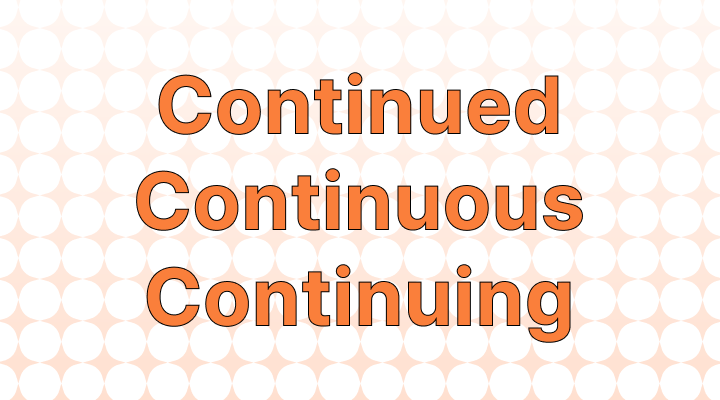- "Thank you for your continued support" is the most standard phrase to use instead of "thank you for your continuous/continuing support."
- The phrase "thank you for your continued support" expresses gratitude to individuals or entities for their ongoing assistance, loyalty, or backing. It acknowledges the sustained commitment and contributions of others in various endeavors or relationships.
- While less commonly used, "Thank you for your continuous support" is appropriate when emphasizing an uninterrupted and unbroken flow of assistance. It conveys a sense of seamless and sustained backing without gaps or disruptions.
- "Thank you for your continuing support" emphasizes the ongoing nature of the support, highlighting its perpetual and unending quality. This term is suitable for expressing gratitude when you want to underscore the sustained and persistent assistance received.

🙏 As we reflect on another successful year, we want to extend our heartfelt appreciation to each one of you. Thank you for your continued support, which has been instrumental in our achievements and growth.
Among the participants who received a note expressing gratitude from their mentee, 68% included their contact details in the note. In contrast, only 42% of those who received the control note provided any contact information. This observed difference was statistically significant, and is a reason why we should understand how to use these three phrases correctly.
When to use "thank you for your continued support"
Continued Support
- Use this when there's been a resumption or renewed momentum in someone's support after a break or period of less intensity.
- Imagine a project that hit a snag, but your supporter stuck with you. Thanking them for their continued support emphasizes their loyalty in overcoming challenges.
- Example: "Thank you for your continued support through the difficult phase of our startup. Your unwavering belief kept us going."
Continuous Support
- Opt for this when praising uninterrupted and steady backing over a significant period.
- Think of a mentor who consistently offers guidance or a friend who's always there to listen. Their persistent support deserves the "continuous" label.
- Example: "I wouldn't be here today without your continuous support throughout my career. Your mentorship has been invaluable."

Continuing Support
- This strikes a balance between the above two, expressing durability and persistence with a subtle hint of future commitment.
- Imagine loyal patrons of your business or dedicated volunteers. Thanking them for their "continuing" support acknowledges their past contributions and implies your hope for their ongoing association.
- Example: "Thank you for your continuing support of our organization. Your dedication strengthens our mission and inspires us to keep going."
Remember:
- Clarity is key. Choose the phrase that best captures the nature of the support you're grateful for.
- Context matters. Consider the specific situation and relationship to refine your choice.
- Don't overthink it! Any sincere expression of gratitude will resonate, regardless of the exact wording.
Examples from the web
"Thank you for your continued support, and best regards for a fruitful new year as we continue this historic mission." - Unicef
"Thank you for your continuing support." - The New York Times
"Thank you for your understanding and continuous support!" - TechCrunch

FAQ
What is the short phrase for continued?
The short phrase for "continued" is "ongoing" or "uninterrupted." It conveys the idea of something that persists over time without a break or cessation, emphasizing the continuous nature of an action, state, or support.
Summary
In mastering the distinctions between "Are Following," "Are the Following," and "Are as Follows," you empower yourself to communicate with precision and clarity. Tailoring your choice based on the context and formality of your communication ensures that your message is not only understood but also presented in the most effective manner possible.

Want to sound like a native speaker?
Engram’s AI-powered grammar checker makes your English sound like a native speaker’s, suggesting natural English expressions on top of fixing grammar, spelling, punctuation, word order, and vocabulary.

References:















